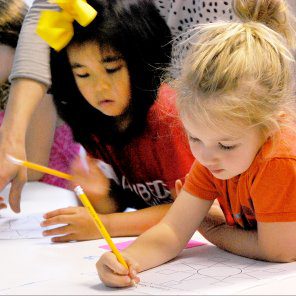April 24-30 is Christian Education Week, and, although Classical Conversations doesn’t specifically celebrate the week, in a broader sense, for CC, every week of the year is Christian Education Week. We believe that true Christianity and true education are inseparable, and it is CC’s vision to help parents educate their children about God, about the building blocks of knowledge provided by God and about how he has hard-wired our children to learn.
Christian Education Week is the perfect time to emphasize the importance of the home in developing Christian faith and to recognize the crucial role that parents and other guardians play. It is an opportunity to be reminded of what God is doing and to consider the difference that Christian education is making in the community, in families and in the lives of God’s children. Parents are the God-appointed leaders and teachers of their children. This should come as no surprise to anyone. God says that the education of children is the responsibility of the parents and is a 24-hour-a-day, seven-day-a-week process that must take place from birth through maturity.
“CC has been committed from the beginning to the primacy of the Christian parents’ role in raising and educating their children,” said Robert Bortins, Classical Conversations CEO. “We know that wisdom comes from God and that all truth belongs to Him, so any form of education—classical, homeschool, public, private—must be informed by our understanding of God, otherwise it is without true value.”
Bortins’ argument is in line with Scripture: verses like Deuteronomy 11:18-21, Proverbs 9:10, Proverbs 22:6 and Ephesians 6:4 come to mind.
So, parents are ALWAYS the primary teachers of their children, but what do they need to teach them? God has a great deal to say about this. We start at the beginning with the creator of the universe and the author of all truth. Proverbs 9:10 says, “The fear (understanding) of the Lord is the beginning of wisdom, and the knowledge of the Holy One is insight.” The most important goal for Christian parents is for their child to know God in a personal way and to know all about God. Nothing could be more important.
Finally, note the Deuteronomy passage and the context. God is instructing His people how to live as they prepare to go into the Promised Land. Critical to the life and health of His people is the teaching of the Word of God by parents on a daily basis in every situation. Parents must also teach knowledge not specifically contained in Scripture, preparing them to live successful, fruitful lives, but that knowledge, again, is useless without viewing it through the lens of Scripture.
This week, while you are at home teaching your children or at a CC community day, take the time to remind yourself of why you teach your children and who you are doing it for. May you celebrate Christian Education Week every week throughout the rest of your homeschooling journey.
Here are some big ideas to consider about Christian education
- There are basically two kingdoms: a kingdom of light and a kingdom of darkness. It seems strange to have those who walk in darkness educate children of light. It doesn’t fit.
- If Jesus Christ is Lord, then He is Lord of all. We cannot divide things into secular and sacred.
- All truth is God’s truth, and God’s Word sheds light on our path. Only in His light can we see light. Education is not focused on possibilities but on certainties found in God’s Word.
- Deuteronomy 6 tells parents that, in all they do, they should provide a godly education, 24 hours a day, seven days a week.
- Three key institutions that shape a child are the home, the church and the school. Children are served best when all three institutions point them in the same direction. (Fortunately, we know that home and school can be one institution)
- Only an education that has the liberty to address the whole child—social, intellectual, emotional, physical AND spiritual—reaches the possibility of excellence.
- The best preparation for effective service is to be well grounded in one’s mind before direct engagement with the culture.
—provided by Discover Christian Schools




